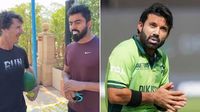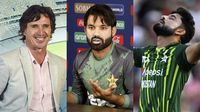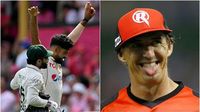Former Australia cricketer Brad Hogg has come under fire for mocking Pakistan captain Mohammad Rizwan’s English in a viral video that has drawn widespread criticism from fans.
The clip, posted around March 16, 2025, showed Hogg conducting a mock interview with a content creator impersonating Rizwan, seemingly ridiculing his English-speaking skills. In the video, Hogg asked the impersonator, "What do you think about Virat Kohli?" to which the impersonator humorously responded, "I and Virat are alike. He drinks water, I drink water. He eats food, I eat food. We are both the same; there is no difference.” This statement, while meant to be lighthearted, struck many as offensive.
The backlash against Hogg began to intensify on March 18, 2025, with social media users openly criticizing his actions as "distasteful" and inappropriate. One user commented, "Absolutely distasteful from Brad Hogg to engage in this mockery of Rizwan. Used to think he was a decent bloke, guess not.” This sentiment was echoed across various platforms, as fans expressed disappointment in Hogg's behavior.
Pakistan all-rounder Aamer Jamal also weighed in on the controversy, explicitly criticizing Hogg for his mock interview. He pointed out that English is not even Rizwan's second language, emphasizing that it is, in fact, his third. Jamal took to X, stating, "I just watch a video which is circulating on twitter and others social media. It is a very shameful act from @Brad_Hogg who called himself an international cricketer making fun of @iMRizwanPak about his English which is his third language, not even second.”
Adding to his critique, Jamal suggested that Hogg should focus on becoming a TikToker instead of involving himself with the cricket community, hinting at his need for followers and attention through mocking others. "I would rather suggest you to become #TikToker because you might need followers and attention by making fun of other people; that’s the platform for you, not the cricket community,” he wrote.
The criticism wasn't limited to Jamal, as numerous fans online pointed out the cultural implications of Hogg's actions. One user wrote, "We living in the subcontinent should get out of this colonial mindset. English is not our language or mother tongue. Our players should speak Urdu and take your translator with it. This is our national pride, not English. Pathetic unprofessionalism by ex-cricketers!" This highlights a significant point: the expectation for players from non-English-speaking backgrounds to communicate fluently in English can be rooted in a colonial mentality.
In the context of cricket, where communication is key for teamwork and strategy, the pressure on players to master English often overshadows their primary skill sets—batting, bowling, and keeping. Rizwan, who has been sacked as T20I captain but will lead Pakistan in an upcoming three-ODI series against New Zealand starting March 29, 2025, exemplifies this particular struggle. Despite his contributions to the game, some of which are monumental, he found himself at the center of an unwanted controversy.
This situation raises broader questions about the cultural expectations placed upon athletes, especially in international sports. Are athletes judged more on their language skills than their performance on the field? Are they subjected to ridicule for failing to meet these expectations? The answers remain complex and reflective of societal attitudes towards language, identity, and performance.
Brad Hogg’s recent faux pas serves as a reminder that as we move forward in an increasingly global world, compassion and understanding of cultural differences should be paramount. The backlash against Hogg shines a spotlight on the importance of respecting each others' languages and the diverse backgrounds from which athletes hail.
Overall, the episode serves to underline the necessity for sensitivity and respect, not just within the sporting community but across all areas of cultural engagement. Athletes like Rizwan must not only focus on their physical prowess but also navigate the nuanced expectations of language and representation on global platforms. Ultimately, it’s about celebrating differences rather than mocking them.
As the conversation continues on social media and within the cricketing world, it will be crucial for all stakeholders to reflect on the messages they send and the impacts they create. Sports, after all, should unite us rather than divide us through ridicule.






